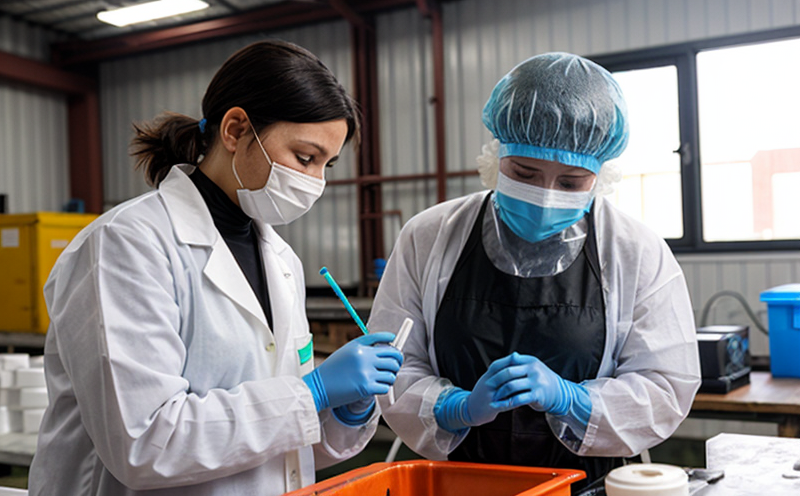ISO 1183 Density Determination of Recycled Nanomaterial Plastics
The ISO 1183 standard is one of the most widely used methods for determining the density of thermoplastics, including recycled nanomaterial plastics. This method is crucial in ensuring that recycled materials meet the same stringent quality and performance standards as virgin plastics.
Recycled nanomaterials are an emerging field within the broader category of sustainable materials. The use of nanotechnology in recycling processes can enhance the properties of recycled plastics, such as reducing weight, improving mechanical strength, or altering thermal conductivity. However, to ensure these benefits are realized without compromising product integrity, it is essential to accurately determine their density.
The process outlined by ISO 1183 involves measuring the mass and volume of a test specimen under controlled conditions. This method is not only accurate but also reproducible, making it suitable for quality assurance in manufacturing processes that involve recycled nanomaterials.
Accurate density determination is critical for several reasons:
- Consistency: Ensures uniform product quality across different batches and production runs.
- Compliance: Meets regulatory standards and industry specifications, such as those required by ISO or ASTM.
- Eco-Friendly: Promotes the use of recycled materials without sacrificing performance, contributing to sustainable manufacturing practices.
- Economic Benefits: Optimizes material usage, reducing costs associated with waste disposal and raw material procurement.
The ISO 1183 method is particularly important for industries where nanomaterials play a significant role in enhancing the performance of recycled plastics. For instance, automotive manufacturers may use this method to ensure that recycled materials are suitable for structural components without sacrificing safety or durability.
Our laboratory adheres strictly to the ISO 1183 standard and uses state-of-the-art equipment to perform these tests accurately. Our team of experts ensures that every step of the process, from specimen preparation to final analysis, is conducted with precision and care. This attention to detail guarantees reliable results that are both reproducible and accurate.
By choosing our ISO 1183 density determination service for recycled nanomaterial plastics, you can be confident in knowing that your products meet the highest quality standards. Whether you're a manufacturer looking to enhance product performance or an environmental advocate seeking to promote sustainable practices, our services provide the assurance needed for compliance and excellence.
Why It Matters
The accurate determination of density using ISO 1183 is vital in several key areas:
- Product Integrity: Ensures that recycled nanomaterials do not compromise the overall quality and performance of a product.
- Regulatory Compliance: Guarantees adherence to industry standards, such as ISO 1183, which are critical for market access in many countries.
- Sustainability: Promotes the use of recycled materials without sacrificing quality or performance, aligning with broader sustainability goals.
- Cost Efficiency: Optimizes material usage, reducing waste and associated costs. This is especially important when dealing with high-value nanomaterials.
In addition to these benefits, accurate density determination also plays a crucial role in research and development (R&D) activities. Engineers and scientists can use the results from ISO 1183 tests to fine-tune manufacturing processes, optimize material blends, and explore new applications for recycled nanomaterials.
Our service is designed to meet the needs of various stakeholders within the industry, including quality managers, compliance officers, R&D engineers, and procurement specialists. By providing accurate density data, we help our clients make informed decisions that enhance product performance while maintaining environmental responsibility.
International Acceptance and Recognition
The ISO 1183 method for determining the density of recycled nanomaterial plastics is widely recognized and accepted across international boundaries. This standard is part of a suite of standards that form the backbone of global quality assurance systems in various industries.
- ISO: The International Organization for Standardization (ISO) has established ISO 1183 as an essential tool for ensuring product consistency and reliability across different regions.
- ASTM: The American Society for Testing and Materials (ASTM) also recognizes the importance of this method, integrating it into its own suite of standards where applicable.
- EN: European Standards (EN) often align with ISO standards, meaning that compliance with ISO 1183 is equally important in Europe.
- IEC: The International Electrotechnical Commission (IEC), which focuses on electrical and electronic technology, also recognizes the significance of this method for certain applications involving recycled nanomaterials.
The widespread adoption of ISO 1183 across these international bodies underscores its importance in ensuring that products meet global standards. This recognition is crucial for manufacturers looking to expand their markets beyond national boundaries into regions like North America, Europe, and Asia.
Our laboratory is committed to adhering to these recognized standards, ensuring that every test we perform meets the highest international quality benchmarks. By choosing our services, you can be assured of compliance with global standards, which is essential for market access in a competitive global economy.
Use Cases and Application Examples
The ISO 1183 density determination method has numerous applications across various industries. Here are some key use cases:
| Industry Sector | Application Example |
|---|---|
| Aerospace | Determining the optimal blend of recycled nanomaterials to enhance structural integrity without increasing weight. |
| Automotive | Evaluating recycled nanomaterials for use in lightweight components, ensuring they meet strength and durability requirements. |
| Beverages | Assessing the suitability of recycled nanomaterials for packaging, ensuring it meets stringent safety and quality standards. |
| Housing | Testing recycled nanomaterials for use in construction materials to improve insulation properties while reducing environmental impact. |
| Medical Devices | Evaluating the density of recycled nanomaterials used in implants and prosthetics, ensuring they meet biocompatibility and performance standards. |
| Consumer Electronics | Determining the optimal use of recycled nanomaterials for lightweight, durable casings that enhance product design. |
In each of these industries, accurate density determination is critical to ensuring that recycled nanomaterials perform as intended. By adhering to ISO 1183 standards, we help our clients achieve the best possible results in their applications.





